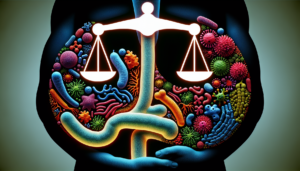The Impact of Stress on Gut Health
The Connection Between Stress and Gut Health
Understanding Gut Health
Gut health refers to the balance of microorganisms that live in the digestive tract. The human gut is home to trillions of bacteria, fungi, and viruses, often referred to as the gut microbiome. This microbiome plays a crucial role in digesting food, producing essential vitamins, and regulating the immune system. A balanced gut microbiome supports overall health and well-being, while an imbalance can lead to various health issues.
The Role of Stress in the Body
Stress triggers a complex physiological response known as the "fight or flight" response, which prepares the body to react to perceived threats. This response is mediated by the release of stress hormones such as cortisol and adrenaline. While short-term stress can be beneficial, chronic stress can lead to health complications, including gastrointestinal issues, due to prolonged hormone exposure.
How Stress Affects the Gut
-
Alterations in Gut Microbiome
Chronic stress can significantly alter the composition of gut bacteria. Studies indicate that stress can reduce the diversity of gut microbiota, favoring opportunistic pathogens over beneficial bacteria. This dysbiosis can lead to gastrointestinal issues, including irritable bowel syndrome (IBS), leaky gut syndrome, and even inflammatory bowel diseases (IBD) like Crohn’s disease and ulcerative colitis.
-
Increased Gut Permeability
Chronic stress can increase intestinal permeability, often termed "leaky gut." This condition occurs when the junctions between gut cells become loose, allowing toxins, bacteria, and undigested food particles to enter the bloodstream. The immune system may respond to these foreign substances, leading to inflammation, which is associated with various chronic diseases.
-
Disruption of Gut Motility
Stress influences gut motility, which is the contraction of muscles in the digestive tract. Under stress, the digestive system may either speed up, causing diarrhea, or slow down, leading to constipation. This disruption can result in uncomfortable symptoms and affect nutrient absorption.
-
Changes in Gut pH and Enzyme Activity
Stress can alter the pH levels in the gut, influencing digestive enzyme activity. A more acidic or basic environment can hinder the breakdown of food, leading to malabsorption and nutrient deficiencies.
-
Impact on Gut-Brain Axis
The gut-brain axis is a bidirectional communication network linking the gut and the brain. Stress can influence this connection, leading to a vicious cycle. Stress affects gut health, which in turn can lead to increased anxiety and depression, creating a feedback loop that perpetuates both mental health and gut issues.
Stress-Induced Digestive Disorders
-
Irritable Bowel Syndrome (IBS)
IBS is a functional gastrointestinal disorder characterized by abdominal pain, bloating, and altered bowel habits. Stress is a known trigger for IBS symptoms. Research suggests that managing stress through psychological interventions can significantly improve IBS symptoms.
-
Inflammatory Bowel Disease (IBD)
Conditions like Crohn’s disease and ulcerative colitis are chronic inflammatory disorders of the gastrointestinal tract. Stress does not cause IBD, but it can exacerbate symptoms and trigger flare-ups. Managing stress through lifestyle changes can help mitigate these effects.
-
Gastroesophageal Reflux Disease (GERD)
Stress can contribute to GERD symptoms by increasing stomach acid production and affecting esophageal muscle tone. Relaxation techniques and lifestyle modifications focusing on stress reduction can help manage GERD symptoms.
-
Peptic Ulcers
Although the primary cause of peptic ulcers is usually bacterial infection or prolonged use of non-steroidal anti-inflammatory drugs (NSAIDs), stress can exacerbate symptoms and delay healing. Stress management strategies are essential in treating peptic ulcers.
-
Functional Dyspepsia
Characterized by chronic discomfort in the upper abdomen, functional dyspepsia can be triggered or worsened by stress. Patients often find that stress management techniques can alleviate symptoms.
Coping Mechanisms for Stress Management
-
Mindfulness and Meditation
Mindfulness practices, such as meditation, help reduce stress and promote relaxation. Mindfulness meditation can improve gut health by encouraging a balanced gut microbiome and reducing gut inflammation.
-
Regular Exercise
Physical activity is a powerful stress reliever. Engaging in regular exercise can enhance mood, improve sleep, and promote a healthy gut microbiome. Activities like yoga and tai chi can be particularly beneficial for both mental and gut health.
-
Adequate Sleep
Sleep and stress are closely linked. Poor sleep can contribute to increased stress levels, while high stress can impact sleep quality. Prioritizing good sleep hygiene can improve both mental health and gut function.
-
Balanced Diet
Diet plays a crucial role in gut health. A diet rich in fiber, prebiotics, and probiotics can help maintain a healthy microbiome. Anti-inflammatory foods, such as fatty fish, fruits, vegetables, and whole grains, should be prioritized while reducing sugar and processed foods to combat stress-related gut issues.
-
Therapeutic Techniques
Cognitive-behavioral therapy (CBT) and other forms of psychological counseling can help individuals manage stress more effectively. Therapy can teach coping strategies, reduce anxiety, and provide tools to manage stressors.
-
Social Support
Building a strong support network can help individuals navigate stress more effectively. Engaging with friends, family, or support groups can improve emotional well-being and promote coping.
The Role of Probiotics in Stress Management
Probiotics are live beneficial bacteria that contribute to gut health. Research indicates that probiotics may help alleviate the effects of stress on the gut microbiome. Regular consumption of probiotics can improve gut health, enhance mood, and reduce anxiety levels.
-
Effects on Gut Microbiome
Probiotics can restore balance in dysbiotic gut microbiomes, positively influencing gut health during stressful periods.
-
Influencing the Gut-Brain Axis
Probiotics may modulate the gut-brain axis, impacting mental health. Some studies show that specific strains can reduce anxiety and depression symptoms, further benefiting gut health.
-
Recommended Probiotic Strains
Strains such as Lactobacillus rhamnosus and Bifidobacterium longum have demonstrated promising results in reducing stress and anxiety levels, promoting a healthy gut environment.
Conclusion on Stress and Gut Health Dynamics
The relationship between stress and gut health is intricate and multifaceted. Chronic stress profoundly impacts gut microbiota composition, metabolic pathways, and overall gut function. Recognizing the signs of stress and implementing effective stress management strategies can significantly benefit gut health.
By prioritizing mindfulness, diet, exercise, and social connections, individuals can help mitigate the negative effects of stress on their gut health. Embracing a holistic approach to health, which acknowledges the strong connection between the brain and gut, empowers individuals to cultivate both mental wellness and optimal gut function.
Maintaining gut health is not just about diet—it’s about fostering resilience against stress, leading to a more balanced and healthier life.








